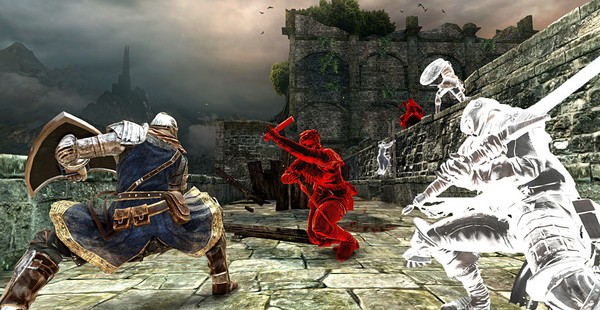
Storyplay: Out of Coins and at Peace
Melody explores want and death in Continue?9876543210 and Dark Souls.
– What do you want?
– To complete my quest.
– Your new quest is to be free, want nothing, and go at peace into your death. Take in the wonder of existence, and then want nothing else from it. Only then will you be ready.
Most games are full of want. There is a quest, an objective, and everything else is just a means towards that objective. The entire game is in achieving, in winning. As players, what we dread most of all is that screen that tells us that we’ve died, that we’ve failed. Every time, we insert another coin and try again.
Continue?9876543210 (or just Continue) begins where other games end, or at least where they let the player restart. The player character of what looks like a generic RPG has just died; she is hemorrhaging coins, hearts, and mana. The “continue?” countdown ticks from 9 to 0, and the machine on which the game is running flags the character for deletion. But the character remains in the RAM, for a while, until the process gets around to deleting her.
The game takes place in this limbo: shatters of places and people left over in the RAM, waiting to be deleted. There is no if, only when. The player character rebels against their destiny: “I’m not ready to die yet.” There is a quest to be completed; it’s not acceptable to just give up. What kind of life is that? How can one find peace when one’s dreams remain unfulfilled?
Continue is a journey, not unlike those that are common in RPGs, but what sets it apart are the stakes. It’s not about achieving fame, earning riches, or defeating evil. It’s a personal journey about accepting death, getting rid of want, and achieving a sense of inner peace.
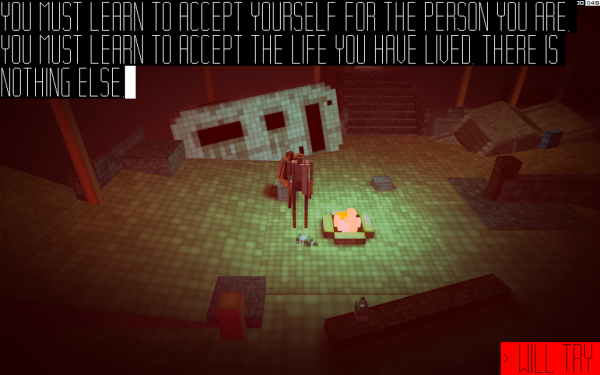
The mythology of Continue is very simple. There is life, and there is death. There is want, and there is freedom from want. To want is the natural state of life; it’s impossible to satisfy one’s want. To want is to be burdened, to feel anxiety and unrest. One always wants more, and more. It’s “not worth it to follow your want,” a friend explains at the very beginning, when you still cannot really understand him. Only “with no want in our hearts” can we be at peace. One who truly is at peace will be able to stare unperturbed at the most cruel of truths: the inevitability of death.
This essential constellation of life, death, and want conjures up memories of another, far more famous series: the Souls games. The ethics of these two works begin from very similar ideas. They practically speak the same language, but they end up in remarkably different places.
Continue is a Buddhist monk; it is Herman Hesse’s Siddhartha. Dark Souls is an existentialist philosopher, Camus’ The Myth of Sisyphus. For both of them, life is a harsh, cruel struggle of the will against the world. But the meaning of the struggle couldn’t be more different.
In the universe of Dark Souls, there are only two states of being: being hollow, and not being hollow yet. To be precise, the players never go fully hollow: at most they are in the process of hollowing. Going hollow is tied to losing one’s will, passion, and desires, the things that make one want to keep on living. A hollow may still have a sense of what they wanted when they were alive, but they have lost the strength and the presence of mind to actually pursue it. Hollows have gone mad and are little more than zombies.
In a universe populated by the undead, it is not a stretch to equate hollowing with dying: not only is hollowing already a kind of mental death, as one loses one’s identity, but hollowing is inevitable, although it may be staved off. “All Undead will one day lose their mind and go hollow.”
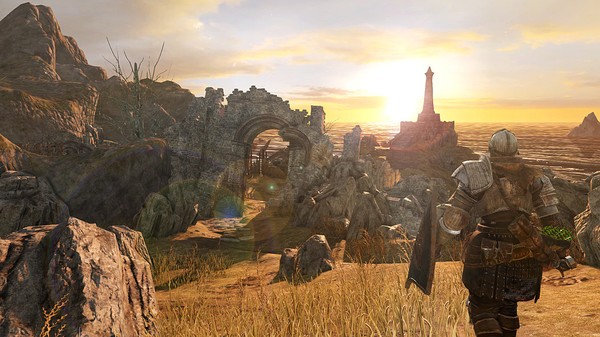
I’ve always liked to think that the player character may be hollowing by being defeated and frustrated in his pursuits, but he cannot completely hollow as long as he keeps playing. And the character goes hollow only when the player stops playing, for it is then that they have lost the desire to be and act in those worlds. The player can move on, but the character is left behind. The wiki offers a helpful remark in this direction:
In general, it seems that Undead go Hollow more quickly when they have no further goals or purpose. Even characters like Blacksmith Lenigrast who are visibly almost fully Hollow can maintain their lucidity if they are focused on their craft.
Time is also interpreted in a cyclical sense: decay is inevitable, darkness is always threatening, and only through a great sacrifice can there be a moment of respite. Kingdoms follow the same arc as the individual: though there may be a short period of splendor and grandeur, it is always in the past. Souls games begin when those kingdoms have fallen, when their magnificent castles are in ruins and chaos has triumphed over order.
Dark Souls celebrates the beauty of the struggle itself, the incomparable nobility of persevering through difficulty and failure, aware of the hopelessness of our situation. There may be no meaning in the world, we may be eternally condemned to repeating the same things over and over (new game plus), sentenced to never truly die, but the struggle is its own reward, its own meaning. “The struggle itself […] is enough to fill a man’s heart,” writes Camus, even with no hope of actually changing things. Forget about dying: one can face death with pride, as long as one has truly lived. The death that is to be feared is the one that comes when the will to struggle is lost, when one gives up.
It makes sense, then, to praise the Souls games’ difficulty and to appreciate their combat. Learning the beauty of the struggle requires an adequate challenge and a satisfying system to master, lest it become tedious busywork. The attention that went into making the combat of those games assumes, in the context of their ethics, a much greater significance than simply making an enjoyable game or catering to hardcore players. A Souls game that was easy and immediate would be at odds with its fundamental philosophy: if beating it didn’t require time, patience, practice, and determination, if there were no challenge to overcome, the very core of the experience would be lost.
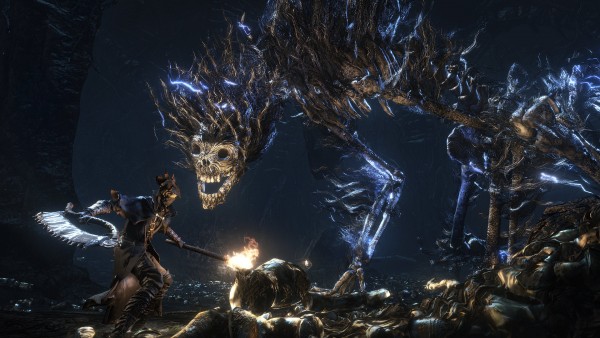
Similar to how difficulty is employed in the Souls games, Continue uses procedural generation and permadeath as an organically coherent part of its world in order to communicate its core experience. The protagonist travels, but it’s not up to them where they will end up, just as it’s not up to them where they started from, where they were born. After all, this is not a real space: we walk among whatever pieces of data have been left over in the RAM, ready for deletion. The point, we’ll see, is learning to let go and accept what comes without trying to control it at all costs.
The protagonist is also randomized for each playthrough, although it’s just an aesthetic change, and you can see the name of the current sprite in the menu. Permadeath, paired with procedural generation, makes the life of every protagonist somewhat unique. There are only a handful of levels, and the core gameplay remains the same regardless, but your protagonists remember where they’ve been. Their life experiences shape them, and they treasure them until they die.
Each level is centered around a community, as well as around a certain theme or way of life. In “Micronesia” people live at the feet of a volcano. On the “River Ganges” the player is greeted by words impregnated with Hindu beliefs. The “City of the Last Princess” is a feminist level, full of princesses who saved themselves and reclaimed their own independence. Then there is a “Mining Town,” an “Iceport,” a “Prison,” and even the “Wild Shores of Love,” each one of them an oneiric rendition of a core idea and of the community of people surrounding it.
I stress this aspect of community because it’s central to the philosophy of the game: the journey of Continue is not a solitary one, but one that comes in contact with different ways of living. It’s not enough to read about different people and lifestyles in a detached and abstract way; one has to live and breathe the daily life that a certain set of values and material conditions brings about. The player progresses in the game by talking to people, listening to them, caring about them, remembering what they say, and learning how they live and what they value.
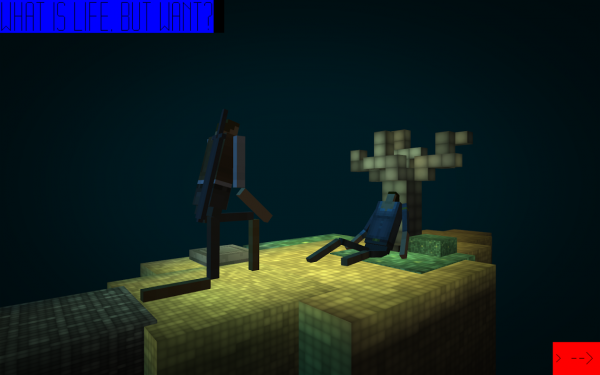
In keeping with the dreamlike rhythm of the game, every level ends with these words or slight variations: “And though I left, I took with me their lightning and their prayers.” “Lightning” and “prayers” are recurring motifs in the game, and are respectively a destructive and a constructive principle. What’s important here is that the journey enriches the character’s inner life. In fact, when it’s time to be deleted, the game slows down to show us what our character is thinking. She formulates a prayer reflecting the experiences she’s had, with each line echoing one of the levels she visited. The value of the journey is quite different here: the focus is not on persisting through difficulty and failure, but on what the journey can teach us, something that cannot easily be learned any other way.
Dying in Continue is not simply a matter of losing. In fact, every playthrough ends with the protagonist’s death. There can be no victory, only a longer or shorter life. But Continue asks us to reevaluate our prejudices. We all die; there’s nothing that can be done about it. What matters is our relationship with death— and consequently, our relationship with life.
As mentioned above, to live is to want. Want cannot be placated by achieving the object of desire: there may be a moment of respite, but soon enough we just start to want something else. Want is insatiable, and it makes us invest our own happiness into attaining the object of desire. It is the endless repetition of this basic process, in all its meaninglessness, that leads to suffering, anxiety, and fear of death. But the things we want are fragile; we may lose them at any time, or we may simply run out of time ourselves and not be able to get the next thing we want. Want rebels against death and leads to a life of restlessness.
Dark Souls tells us that to stop wanting is to die. It wants us to embrace want as what defines us. Continue, following some basic Buddhist principles, tells us that a life of want is one of restlessness and encourages us to stop wanting in order to find peace. To stop wanting is not to be immobile and wait for death to come, but simply to learn to appreciate things for what they are in themselves, without seeing them as means to an end nor to charge them with the task of making us happy.
To make an example: most games are objective-driven. We play in order to achieve our goals, and everything has value only insofar as it’s useful to our ends. The typical RPG grind towards bigger and bigger numbers is especially poignant here. We believe that this will make us happy and fulfill us, at least in the context of the game; even though we are never satisfied, we always strive for more. This is to want. Imagine now if you lost your save and had to start again: this would frustrate you immensely, as all your progress would be lost. From the perspective of a Souls game, this wouldn’t matter much, as your past records and achievements don’t matter. What’s important is to keep fighting in the present.
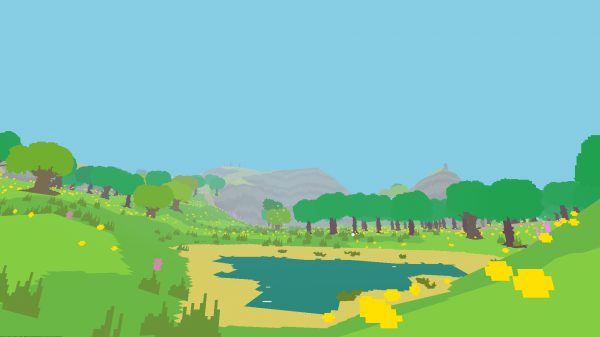
Now take a game like Proteus, which is essentially a game with no want. The value of Proteus lies not in achieving something— there is an end, but there are no meaningful objectives, and subsequently no challenge either— but in appreciating every little thing for what it is, opening oneself up to every single moment with a sense of wonder. And if there was a malfunction and the game stopped running, that would be fine. In this perspective, we would be ok with dying or losing our save at any moment, for we have learned to take pleasure in the present, without attaching our own happiness to anything outside of ourselves. Continue encourages us to live our life the same way we play Proteus. Both perspectives, then, overcome the meaninglessness of life by focusing on the present. But by now it should be clear how different their posture towards the present is.
Let us go back to our initial quote: “Your new quest is to be free, want nothing, and go at peace into your death. Take in the wonder of existence, and then want nothing else from it. Only then will you be ready.” The person our protagonist seeks, from one level to another, delivers this extremely concise and effective formulation of Continue’s philosophy; these words are meant to guide the player on their journey. Now the meaning and significance of each word should be clear. This “new quest” is precisely in contradiction with the internal logic of any other quest. If Dark Souls is proud of itself, Continue is humble.
Dying soon after the game starts means dying with a sense of fear, rejection, misery, and dissatisfaction. The character has not been able to change her attitude towards life and want. On the other hand, the more experiences our protagonists have made, the more they have learned to be open and receptive to life. Her prayers and utterances reflect this: “Let me be at peace with the cruelty of your truth,” she begs. Again: “Cease the synapses of my ever-thinking brain, so that I may know no value in that which is there.” These are signs of struggling with this change in mentality until, finally free of want, they are able to appreciate “the wonder of existence” and face death with a sense of enlightenment. To journey, Continue argues, was necessary for this shift in mentality to happen.
I needed to leave to find myself, and only out there, alone and away from home, could I perceive the innoble meters that burdened me.
And later:
[Everything] seemed to brim with significance and meaning. […] And the memories I took of [the places and people I visited] felt like prayers gathering within me. Soothing my want. And guiding me to moments of wonder.
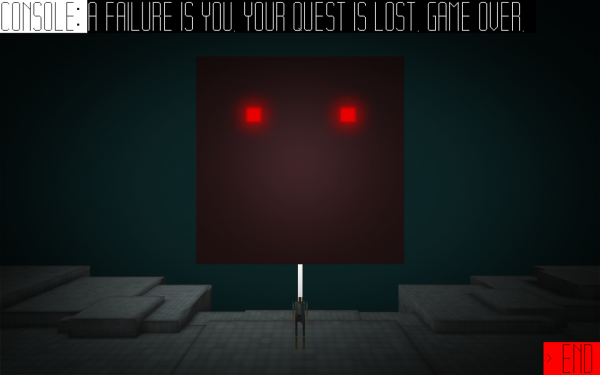
Given this perspective, it also makes sense that Continue‘s combat is shallow and somewhat frustrating. Not that this is an excuse, but it was an afterthought, by the author’s own admission: “I also realized that games that do these things [i.e., explore philosophical ideas in a prominent way] can be complete pretentious snore-fests, so I did my best to have plenty of action, strategy, and game dynamics to keep people involved.“ It may have been a more coherent and powerful work as a “pretentious snore-fest.” Not that all the mechanics that have been implemented are bad; some of them actually enhance the resonance of the game’s themes.
At the same time, Continue is a difficult and very punishing game. One mistake can ruin 30 minutes of perfect play, and more often than not the awkward controls work against the player. So a player who wants to see a better ending by progressing further has to try and fail and retry, again and again. When she finally makes it, the reward is at odds with the challenge. Whereas Dark Souls is driven by the desire to overcome the challenge, Continue is supposed to be a journey in which the players gets rid of their want, emptying themselves and accepting things for what they are. But the experience of actually playing it means that to “accept yourself for the person you are” you cannot accept all the previous attempts in which you lost sooner than you would have liked; in sharp contrast with the opening of the game, when we failed to let go and accept our death, we’re encouraged to make the same mistake again.
Maybe it’s natural, given their philosophies, that the Souls games present themselves as a more coherent package, while Continue’s narrative elements find themselves at odds with its gameplay. Continue falls apart when it needs to be brave and bold enough to deny its own gaminess for the sake of its ideas. Having to beat the game in order to find peace is a perspective that is at odds with the very message of the game, especially so when it is this difficult. The game fails to take its beliefs to their extreme consequences: it gives us a score, it judges our performance, it wants us to replay it, instead of telling us that it’s ok, that we can stop playing at any time, even if we haven’t seen the best ending. I would have loved to see a gentle encouragement to stop struggling, to stop playing and replaying. To let go and be satisfied with what we have. To learn to see beauty even in an incomplete and imperfect life.
Be at peace with the life you have lead. Want nothing else.
Melody is passionate about games, words, and music, and she expresses her love by meowing. You can find her on her blog, and on Twitter.